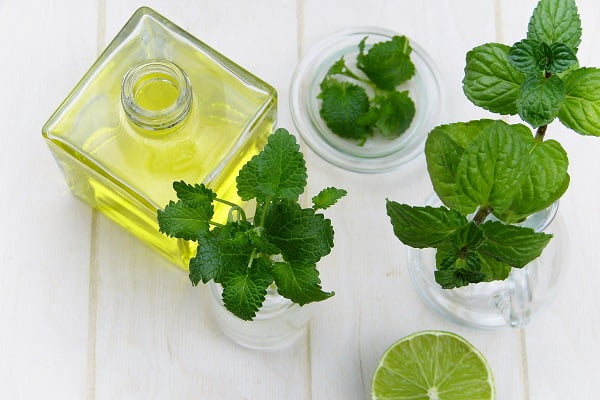One of the most beneficial essential oils available is peppermint oil. You can apply it topically, orally, or aromatically to treat various health issues, including digestive problems, fatigue, and symptoms of seasonal allergies. Additionally, peppermint oil is frequently used to increase energy and enhance the condition of the skin and hair.
Peppermint Oil: What Is It?
A hybrid of water mint and spearmint, peppermint is a plant (Mentha aquatica). The new aerial parts of the flowering plant are used for CO2 or cold extraction to obtain essential oils. Menthol (50–60%) and menthone are the most active chemicals (10 per cent to 30 per cent).
Peppermint comes in various forms, including peppermint leaves, spray, tablets, and essential oil. Its active components cause the stimulating and energetic properties of peppermint leaves.
Due to its therapeutic qualities, menthol oil is frequently used in balms, shampoos, and other body treatments.
Benefits and Uses of Peppermint Oil
Among the numerous applications and advantages of peppermint oil are the following:
Sinus Treatment and Respiratory Support
Aromatherapy with peppermint might help clear your sinuses and soothe a scratchy throat. It functions as a revitalizing expectorant, opening your airways, removing mucus, and easing congestion.
It is also among the most incredible essential oils for respiratory ailments like bronchitis, asthma, sinusitis, coughing, colds, and the flu.
You can make a vapour rub by combining coconut oil, eucalyptus oil, and peppermint oil. You can apply two to three drops to your temples, chest, and back of your neck or diffuse five drops of peppermint oil.
Relieves Seasonal Allergies
During allergy season, peppermint oil can help rid your respiratory system of debris and pollen by relaxing the muscles in your nasal passages. Its expectorant, anti-inflammatory, and energizing qualities make it one of the most incredible essential oils for allergies.
Diffuse peppermint and eucalyptus oil in your house to help reduce the symptoms of seasonal allergies, or topically apply two to three drops of peppermint oil to your temples, chest, and back of your neck. After applying peppermint oil to alleviate seasonal allergy symptoms, consider purchasing wholesale essential oils for continued use and savings.
Improves Exercise Performance and Energy Levels
Take a breath of peppermint for a healthy replacement for harmful energy drinks. On lengthy drives, in class, or any other period you need to “burn the midnight oil,” it helps you feel more energized.
Put two to three drops to the back of your neck, or take one to two drops with a glass of water to increase energy and enhance concentration.
Soothes Headaches
The benefits of peppermint for headaches include increased circulation, gastrointestinal comfort, and muscle relaxation. Peppermint oil is one of the most suitable essential oils for headaches because these problems can lead to tension headaches or migraines.
Apply two to three drops to the forehead and back of your neck to utilize it as a natural headache cure. On touch, it will start to reduce discomfort and stress.
Supports Oral Health and Freshens Breath
The peppermint plant has been naturally used to refresh breath for over a thousand years. This is most likely a result of peppermint oil’s ability to eliminate germs and fungi that can cause cavities and infections.
Try preparing my homemade mouthwash or baking soda toothpaste to improve your oral health and freshen your breath.
Reduces Itching
Being itchy all the time might be annoying. Add a couple or three drops of peppermint oil topically to the itchy area, or add five to ten drops to a warm water bath to reduce irritation.
Apply it topically after mixing it with an equivalent amount of carrier oil if you have sensitive skin. Additionally, since lavender has calming effects, you can combine it with peppermint oil to treat itchiness in a lotion or cream in place of the carrier oil.
Get Rid of Bugs Naturally
Ants, spiders, cockroaches, mosquitoes, mice, and probably even lice detest the smell of peppermint, unlike us humans. This makes peppermint oil an efficient and all-natural pest deterrent for spiders, ants, mice, and other pests. Ticks might also benefit from its use.
Guidelines for Safe Use
Peppermint oil has a wide range of uses. You can use it diluted with or without a carrier oil, and in the proper doses, it is safe for both internal and exterior use (when used topically).
Here are a few secure and practical ways to incorporate it into your daily activities:
Diffuse It
Do you want to be awake and focused? To effortlessly fill a space with an energetic smell, try adding five drops to a diffuser. Even your breathing may improve as a result of this type of aromatherapy. There is no need to hold your head over the diffused air when using essential oils; adhere to the safety precautions and breathe in the aroma as it fills the space.
Use It For Cooking
A unique, all-natural method to add the benefits of peppermint oil and a tremendous minty punch to foods is by using edible essential oils like peppermint in cooking. Who wants some peppermint bark?
Add It In Drinks Or Smoothies
Can peppermint oil be drunk? This is a common question. Pure peppermint can add a refreshing kick to a beverage, whether you add one drop to your cup or two drops to a smoothie.
Use It To Make Massage Oil
Can peppermint oil be used directly on the skin? Yes! Peppermint oil is ideal for massage oil because it calms, cools, and energizes. It would help if you diluted several drops with almond or grapeseed oil. You can use eucalyptus and lavender for further relaxation.
Use It To Scrub Your Feet
Are you sick of using cosmetics and personal care items that contain questionable chemicals? Every time you can, I advise manufacturing your homemade products. Peppermint oil is a lovely addition to a foot scrub that exfoliates to treat your feet.
Conclusion
Peppermint oil is soothing, energizing, expectorant, antibacterial, antispasmodic, refreshing, and pain-relieving. It is commonly used for pain reduction, respiratory support, allergy relief, and enhanced vitality. What adverse consequences might there be? People sensitive to peppermint oil may get headaches, heartburn, and irritability. You should not apply it on the skin of infants or young children.







